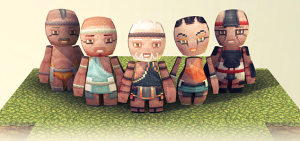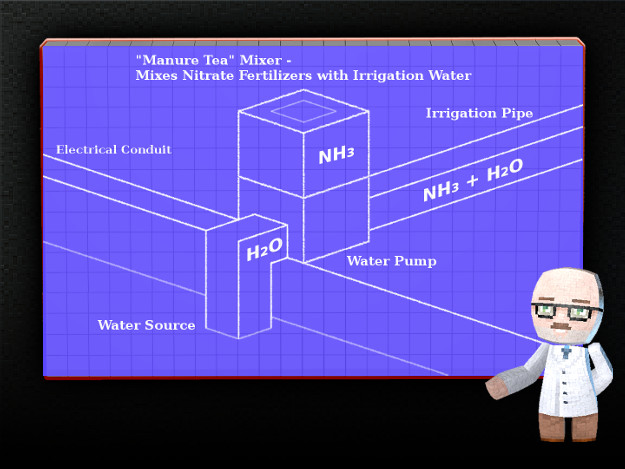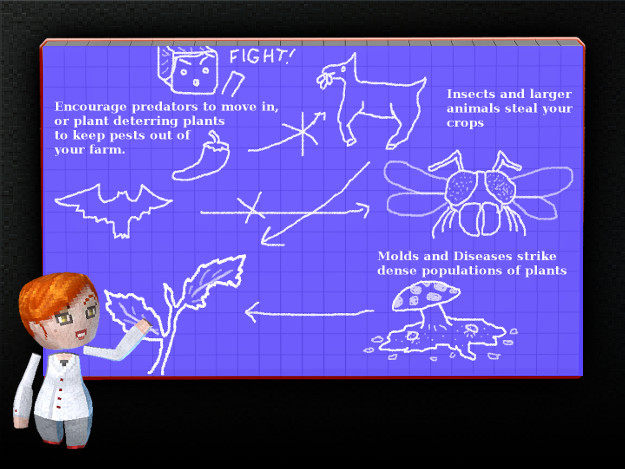Continuing the topic of making non-combat roles entertaining, we’re going to go in-depth on a specific role. Specifically, the art of farming in this article.
Why Farming?
Farming is an unavoidable basis of civilization; In fact, the act of settling down to farm is practically the defining starting point of all civilization, so it’s obviously going to be a big part of the game. Players can happily ignore all the farmers, but we also wanted to make farming an enjoyable and worthy role for the player, themselves.
Farming done in its most basic form would be a boring chore – a little more than throwing seeds at specially designated dirt tiles, maybe requiring that those tiles be wet, but little else. However, there are ways to make this task more engaging than just the micromanagement of remembering to throw seeds down.
Engineering Bio
The system for farming we want players to engage in is based upon making farming no longer a free infinite fountain of resources – you have to supply even more basic resources to the soil to keep plants growing, while also keeping certain things that are bad for the plants away.
Players will need to irrigate their fields, and water will hopefully be consumed by this; This requires players secure continuous access to water supplies, such as aqueducts from a river, rather than just a bucketful of water that lasts forever. The act of transporting this water, and metering it out can be a good use of the engineering in blueprints. Players also need fertilizers to keep their soil fertile, and this means, before industrially-produced fertilizers were technologically available, “recycling” living matter one way or another. The organic matter of dead animals, decaying plants, or leftovers of food being composted are a base source of fertilizer, and you have to engineer the way to produce and deploy it. Figuring out systems to keep their plants fed is a basic part of farming.
Players also do not need to farm themselves. Players can use the blueprint and core block system to manage their farm property with hired laborers that follow patterns the player can instruct or demonstrate. (Or just buy it, but where’s the fun in that?)
Pests and Ecology
We also introduce pests to provide a challenge to players past engineering their farm in the first place. Insects, rabbits, molds, or diseases may assail your crops – and you have to functionally come up with counter-measures. If insects besiege your crops, maybe you can entice a colony of bats to live near your farm by building housing for them, and the bats will consume those pesky insects. Dogs can chase rabbits away. Planted herbs may repel insects or even attract predators of the pests eating your crops. Parasitic funguses may require holding off on planting vulnerable crops until the fungus goes away. Farming becomes like a slowed-down tower defense game, where you must engineer defenses for your crops.
What’s more, we hope to connect all of this to a wildlife population system and simulated ecology, so that the way that you act can have unexpected consequences; You might introduce an invasive species, and see native species crowded out by what you introduced, or accidentally cause an extinction with reckless dumping of toxins or setting wildfires. Also, nearby NPCs from a town or city may also harm farm production by polluting your land. There is more to be considered than just finding a flat piece of land. Crops are dependent upon climate and different soil types that may suit different plants better. (All of this is before we even talk about magic/fantastic plant forms.)
To the Dinner plate – and beyond!
As we said in the first part of the series, computer games work best when they are about spatial problems, rather than just math problems. Rather than just waiting for a number to count up to harvest, in a tile of dirt in its own little world, farms are interesting when they are part of the space around them. You have to think of your farm as a fort to be protected, but which may also hurt the world around you.
Beyond simply being a way to stave off starvation, the greater agriculture system is a source for a wide variety of resources, and if the amount of organic material you can grow is limited, then it poses interesting challenges to the player. The same nitrates that are fertilizer are also used in the creation of gunpowder; In a war, do you starve your population to feed the ammo needs of the army? Animals need food, so pets and work animals must be weighed against other uses of land, like fibrous plants for textiles industries, or plant oils and proteins used in a host of other industrial processes. With magic and alchemy, farming magic plants can give you potions and reagents. You only have fertilizer, land, and labor resources to grow so much, so what do you prioritize?
Also, we do forum polls (regular and backers-only) – vote for favorite player role (whether it be farming or otherwise) or combat style today!
Help support our crowd funding campaign on our website. Earn Backer's Access and other rewards.
- The Imagine Nations Team




